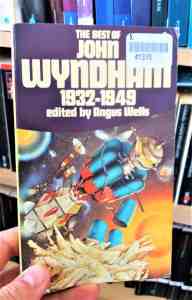In this week’s Dispatches from The Secret Library, Dr Oliver Tearle enjoys some vintage science fiction courtesy of The Best of John Wyndham, 1932-1949
I’ve blogged before about my discovery of John Wyndham’s science fiction in a local charity shop, which had a number of old paperbacks for 99p each. That initial book haul yielded, among others, The Seeds of Time, one of a number of short-story collections published by the master of what Brian Aldiss called (perhaps a tad unfairly, if not reductively) the ‘cosy catastrophe’. But John Wyndham had served a long apprenticeship by the time he became a household name in the 1950s thanks to The Seeds of Time, The Midwich Cuckoos, The Chrysalids, The Kraken Wakes, and, first and chief of all, The Day of the Triffids. The Best of John Wyndham, 1932-1949 showcases the best of John Wyndham’s early stories.
In my previous blog post, I mentioned how John Wyndham is a ‘charity shop’ author: his novels frequently turn up in branches of Oxfam or Age UK for 99p in slightly battered Penguin paperbacks from the 1960s and 1970s, and as I said, this is how I (belatedly) got into his work, having come across a pile of them in these exact circumstances. In that first haul, it was later, mature Wyndham that I picked up, dating from the 1950s and 1960s. But although The Day of the Triffids in 1951 marks Wyndham’s ‘beginning’ as a major writer, he had already published a number of SF novels under the name John Beynon (Beynon being one of his many middle names), including several planetary romances, as well as many stories in the magazines of the era. And although he would really find his own voice as an author – and, more crucially, his distinctive theme or set of loosely related themes – Wyndham’s early work shows a writer beginning  to shake himself loose from the shackles of the pulp fiction market and the constraints of formulaic genre fiction. Indeed, in these early John Wyndham stories we find him already high on concept, not settling for run-of-the-mill space operas or adventure stories where colonial subjects have been swapped for aliens from another planet. He’s already doing what science fiction does best: asking big questions and exploring the implications of certain developments in science and society.
to shake himself loose from the shackles of the pulp fiction market and the constraints of formulaic genre fiction. Indeed, in these early John Wyndham stories we find him already high on concept, not settling for run-of-the-mill space operas or adventure stories where colonial subjects have been swapped for aliens from another planet. He’s already doing what science fiction does best: asking big questions and exploring the implications of certain developments in science and society.
In this collection of his early short fiction, we find the best of Wyndham’s early short stories, including a machine’s account of its origins on Mars and its subsequent mistreatment on Earth (‘The Lost Machine’); a dim reflection on humanity, focusing on a man attempting to convince the people of Venus to have nothing to do with the ‘lost cause’ of Earth (‘The Man From Beyond’); and an update on the Frankenstein story, centring on a scientist trying to create the perfect being with disastrous consequences (‘The Perfect Creature’). Elsewhere, ‘The Trojan Beam’ betrays its original context of the 1930s Sino-Japanese War (the story was initially published in 1939) and focuses on a British secret agent who passes between China and Japan, witnessing the Trojan Beam, a device used to alter the balance of power between the two countries. If ‘The Perfect Creature’ is Wyndham’s take on Frankenstein, then ‘Vengeance by Proxy’ is his Dracula, a vampire story that is more horror than science fiction; while the final story, ‘Adaptation’, splices the scientific with the personal as one man tries to find his missing daughter, in a story that is a meditation on Darwinian evolutionary adaptation but with the human element never far out of sight.
These stories are best viewed as ‘Saturday matinee of the mind’ fare, with more weight and meaning than George Griffith’s early Victorian planetary romances but less excitement and adventure than the queen of the science fantasy, Leigh Brackett. Wyndham’s imagination was top-notch, and even in these early stories which predate his more famous disaster novels, he is exploring the ideas of the day using the solar system, robotics, and space travel to think through issues such as war, the future of humanity on Earth, and genetic engineering. But first and foremost the stories are entertainment, and they succeed, brilliantly. If anyone had the right to be called H. G. Wells’s heir in twentieth-century British science fiction, it’s John Wyndham. The Best of John Wyndham, 1932-1949 is well worth picking up – in a charity shop or elsewhere.
Oliver Tearle is the author of The Secret Library: A Book-Lovers’ Journey Through Curiosities of History, available now from Michael O’Mara Books.


Thank you for an interesting article – I loved Wyndham as a teenager and got hold of everything he wrote. The Chrysalids was my absolute favourite, but he fired up my love of the genre which I have never lost – I now write sci fi novels of my own.
Thanks for the comment, as always, Sarah! I hoped this one would grab your eye, knowing you’re an SF author and avid reader yourself. I keep acquiring more and more early Wyndhams, which I can’t wait to read, but The Chrysalids is next on my list. Several people have now said that’s their favourite Wyndham :)
Ah… I hope you enjoy it as much as I did:))